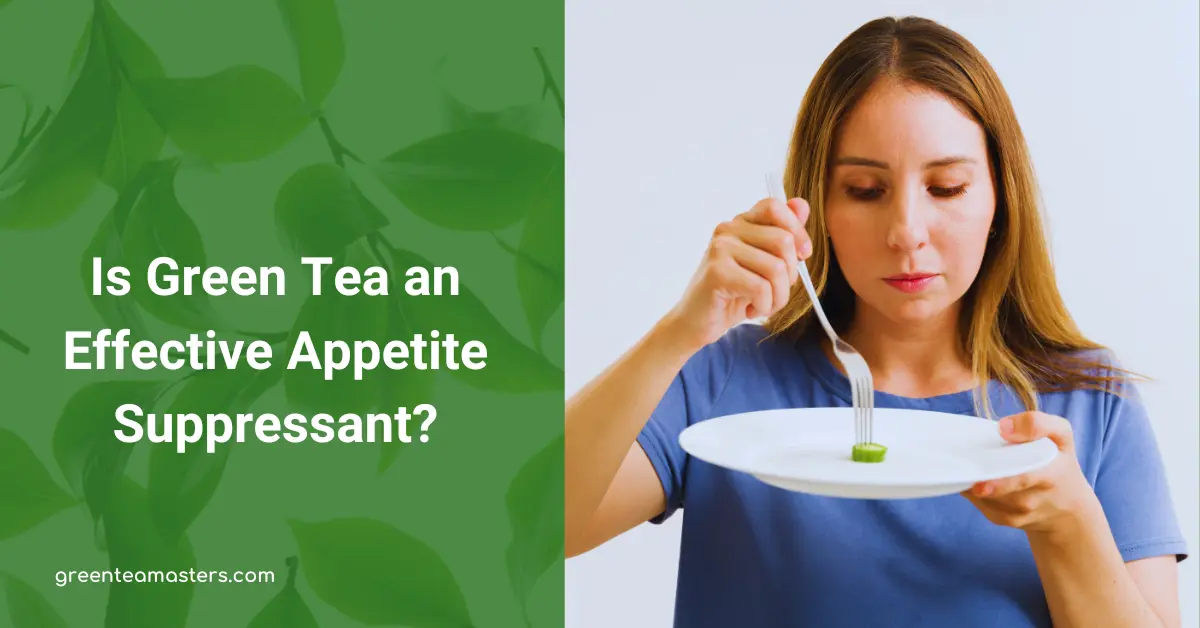For centuries, green tea has been revered as a potent elixir, coveted for its myriad health benefits. From boosting metabolism to fighting inflammation, this ancient brew has earned a well-deserved place in the pantheon of superfoods. But one question continues to linger: can green tea truly help suppress appetite and aid in weight loss? In this comprehensive exploration, we’ll delve deep into the science behind green tea’s potential appetite-curbing powers, separating fact from fiction and empowering you to make informed choices on your journey to a healthier you.
The Catechin Connection: Unraveling Green Tea’s Secret Weapon
At the heart of green tea’s weight loss prowess lies a powerful class of antioxidants known as catechins. Among these, epigallocatechin gallate (EGCG) stands out as the star player, a compound that has been extensively studied for its ability to influence appetite and metabolism.
Numerous studies have suggested that EGCG may help increase feelings of fullness and reduce calorie intake by regulating the hormones responsible for appetite control, such as leptin and ghrelin. By modulating these hormonal signals, green tea may make you feel more satisfied after meals, potentially leading to a reduced overall calorie consumption.
But EGCG’s impact doesn’t stop there. Research has also linked this potent catechin to an increase in thermogenesis, the process by which your body burns calories to produce heat. By giving your metabolism a gentle nudge, green tea may help you burn more calories throughout the day, further contributing to its potential weight loss benefits.
Caffeine: Green Tea’s Energizing Ally
While catechins steal the spotlight, green tea’s modest caffeine content shouldn’t be overlooked when it comes to appetite suppression. Caffeine, a natural stimulant, has been shown to have a mild appetite-reducing effect, potentially by increasing the production of certain hormones that promote feelings of fullness.
Additionally, caffeine’s energizing properties may help counteract the fatigue and lethargy that often accompany calorie-restricted diets, making it easier to stay active and engaged in your weight loss efforts.
It’s worth noting, however, that green tea’s caffeine content is relatively low compared to other caffeinated beverages like coffee, making it a gentler choice for those sensitive to the jitters or sleep disruptions that can sometimes accompany excessive caffeine consumption.
The L-Theanine Factor: Green Tea’s Calm, Cool, and Collected Sidekick
Green tea’s dynamic duo of catechins and caffeine isn’t the only factor at play when it comes to appetite suppression. Enter L-theanine, an amino acid found exclusively in tea leaves that may further enhance green tea’s weight loss potential.

Research suggests that L-theanine may work synergistically with caffeine to promote a state of calm alertness, reducing the potential for jitters or anxiety that can sometimes accompany caffeine consumption.
This relaxed yet focused state may help curb emotional eating and stress-induced cravings, two common pitfalls on the road to sustainable weight loss.
Moreover, L-theanine has been linked to improved cognitive function and mental clarity, which can be invaluable assets when navigating the challenges of adhering to a healthy eating plan.
Factors that May Influence Efficacy
While the scientific evidence surrounding green tea’s appetite-suppressing abilities is promising, it’s important to recognize that its effects may not be universal.
Like all dietary interventions, the extent to which green tea influences hunger and satiety can be influenced by a myriad of factors, including individual metabolism, lifestyle habits, and even the quality of the green tea itself.
Firstly, our metabolic rates can vary considerably from person to person, influenced by factors such as age, gender, and genetics. Some individuals may experience a more pronounced thermogenic response to green tea’s catechins, while others may see more modest effects on calorie burning and appetite regulation.
Furthermore, lifestyle factors like stress levels, sleep quality, and physical activity can all play a role in modulating appetite and energy expenditure.
Those leading sedentary lifestyles or grappling with chronic stress may find that green tea’s impact on weight management is diminished.
Finally, it’s crucial to recognize that not all green teas are created equal. The potency of green tea’s bioactive compounds can vary significantly depending on factors such as growing conditions, processing methods, and storage conditions.
To reap the full appetite-suppressing benefits, it’s essential to opt for high-quality, freshly brewed green tea from reputable sources.
How to Seamlessly Integrate Green Tea into Your Daily Routine
Incorporating green tea into your daily routine can be a simple and enjoyable endeavor, with a few practical tips to maximize its potential benefits:
- Time it right: Many experts recommend consuming green tea in the morning or afternoon, as its caffeine content may interfere with sleep if consumed too close to bedtime.
- Get creative with culinary infusions: Beyond the classic cup, consider infusing green tea into your favorite recipes. From smoothies and oatmeal to marinades and salad dressings, the possibilities are endless.
- Experiment with flavors: Don’t be afraid to branch out from traditional green tea varieties. Explore different blends and flavors, such as jasmine, lemon, or even matcha, to keep your taste buds intrigued and your commitment unwavering.
- Embrace the ritual: Savor the moment and make green tea consumption a mindful ritual. Take a few deep breaths, appreciate the aroma, and allow yourself to be present in the experience.
Remember, consistency is key when it comes to reaping the full appetite-suppressing benefits of green tea. By seamlessly integrating this ancient elixir into your daily routine, you’ll be well on your way to a more mindful and sustainable approach to weight management.
Exploring Potential Side Effects
While green tea is generally considered safe for most individuals when consumed in moderation, it’s essential to be aware of potential side effects, particularly for those with certain medical conditions or sensitivities.
As mentioned earlier, green tea does contain caffeine, albeit in lower quantities than coffee or other caffeinated beverages.
For some individuals, even moderate caffeine consumption can lead to undesirable side effects such as jitters, headaches, and disrupted sleep patterns.
Those with caffeine sensitivities or conditions like anxiety disorders may want to exercise caution or opt for decaffeinated varieties.
Additionally, green tea’s high concentration of catechins has been linked to potential interactions with certain medications, such as blood thinners or chemotherapy drugs.
If you’re taking any prescription medications, it’s always wise to consult with your healthcare provider before increasing your green tea intake.
Lastly, while rare, some individuals may experience mild gastrointestinal discomfort or allergic reactions to compounds found in green tea. If you experience any adverse effects, discontinue consumption and seek medical advice if necessary.
As with any dietary supplement or intervention, moderation and mindfulness are key when it comes to green tea consumption. By staying attuned to your body’s unique needs and respecting its limits, you can harness the potential benefits of this ancient brew while minimizing any potential risks.
The Takeaway: Green Tea, a Powerful Tool in Your Weight Loss Arsenal
So, is green tea an effective appetite suppressant? The answer, according to the latest scientific evidence, is a resounding “maybe.” While green tea’s unique blend of compounds shows promise in regulating appetite and boosting metabolism, its effects are likely modest and should be viewed as one piece of a larger weight loss puzzle.
Nonetheless, incorporating green tea into a balanced, calorie-controlled diet and regular exercise routine can be a smart move for those seeking to jumpstart their weight loss journey. By harnessing the power of catechins, caffeine, and L-theanine, this ancient beverage may just give you the edge you need to conquer cravings, boost your energy levels, and ultimately achieve your health and fitness goals.
Remember, the road to sustainable weight loss is rarely a straight line, but with the right tools and a commitment to healthy habits, you can pave the way to a slimmer, more vibrant you – one sip of green tea at a time.

